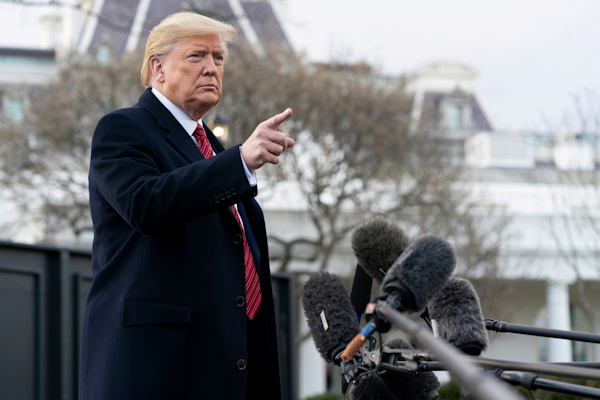SEJournal Online is the digital news magazine of the Society of Environmental Journalists. Learn more about SEJournal Online, including submission, subscription and advertising information.
 |
 |
| Donald Trump, above in 2020 speaking to members of the press, could target journalists for prosecution or hamper the news media in myriad ways if he regained the White House, suggests WatchDog Opinion. Photo: White House/Joyce N. Boghosian (public domain). |
WatchDog Opinion: What Would a Second Trump Reign Mean for Press Freedom?
By Joseph A. Davis
 |
It’s not inevitable. But it shouldn’t come as a surprise. All signs are that a putative second Trump administration would be worse than the first in undermining freedom of the press.
Trump confidant Kash Patel spelled it out. He said in December that Trump would target journalists for prosecution if he regained the White House. The WatchDog has already warned about that. Let’s explore some other possibilities.
For example, what would Trump do about the Freedom of Information Act — still a basic tool for journalists to get public records?
His first administration found ways to choke off FOIA access at environmental agencies by centralizing control of the FOIA apparatus and putting it under political appointees.
Delays in filling FOIA requests, denial of requests, overuse of exemptions, heavy redaction and other sleight-of-hand were used during Trump 1.0 — and could be again — to make records disappear from public view.
A Trump 2.0 Justice Department
could hamstring the ‘presumption
of disclosure’ that is supposed to
guide agencies in FOIA responses.
A Trump 2.0 Justice Department could hamstring the “presumption of disclosure” that is supposed to guide agencies in FOIA responses. Remember the infamous “Ashcroft memo” under the George W. Bush administration, directing agencies to err on the side of nondisclosure?
Congress passed a bipartisan FOIA reform bill in 2016 that codified a presumption of disclosure. But other than taking a nondisclosing agency to court, a frustrated requester has little recourse. Agencies like the Interior Department and the U.S. Environmental Protection Agency could once again sandbag FOIA via agency regs and policies.
Still ‘enemy of the people’
To date, one of Trump’s biggest efforts has been to delegitimize the news media and undermine their credibility. “Fake news” is a phrase he harped on constantly when he was in office. We could expect this to continue.
One insult Trump has liked using toward news media is “enemy of the people.” That label goes beyond undermining credibility to suggest that there is a war going on and that Trump followers should harm the media. When Trump publicly names someone as an enemy, his followers often harass or threaten that person online or in person.
In the recent court cases prosecuting him, Trump’s followers have doxxed, swatted and threatened violence against prosecutors, judges, court personnel, jurors and witnesses. Gag orders to protect jurors and witnesses have not always worked. News media do not even have that protection.
After Trump’s May conviction on 31 counts, his supporters flooded social media with threats of “riots, revolution and violent retribution,” Reuters reported.
Such threats may be empty bravado in many cases, but the intimidating effect is still real. During Trump’s first term, the so-called MAGA bomber mailed explosive devices to many of Trump’s perceived enemies. The bomber, Cesar Sayoc, was convicted and sentenced in 2019. Among his targets was CNN.
The WatchDog can easily imagine many other nightmare scenarios for press freedom under a Trump 2.0. Not only would the Justice Department rule mandating journalists’ right to protect confidential sources become vulnerable to reversal, but the hope of enacting reporters’ privilege via the PRESS Act would likely be lost. We could go on.
Is Times v. Sullivan in the gunsights?
One of the stoutest pillars of press freedom in the U.S. is the 1964 Supreme Court decision in New York Times v. Sullivan. The court held that news media were protected from libel suits by public figures unless the plaintiff could prove “actual malice” and knowing, reckless disregard for truth by the media defendant.
Journalists may still have some faith in Times v. Sullivan. But in February 2016, Trump vowed to “open up our libel laws so when they write purposely negative and horrible and false articles, we can sue them and win lots of money."
Actually, there really are no federal libel laws — as statutes. It’s a matter of state law and common law — which is why the court’s Times v. Sullivan decision was so powerful. The court, in effect, made the law.
If journalists confidently brushed off
Trump’s libel law threat, it was only
because of the 60-year-old precedent
of New York Times v. Sullivan.
If journalists confidently brushed off Trump’s libel law threat, it was only because of this 60-year-old precedent.
The confidence was renewed after the 2023 settlement in Dominion v. Fox. Dominion, a voting machine company, sued the Fox network in state court for knowingly and falsely saying that its machines had rigged the election against Trump. The company sued Fox for $1.6 billion and eventually settled for $787 million in 2023.
The Dominion case never reached the Supreme Court. That may have been a good thing for press freedom. The current Trump-friendly court might not have let Fox take the rap if the case ever reached them.
The majority, at least, showed in the Dobbs decision overthrowing the right to abortion that precedent (and the legal doctrine of stare decisis) meant nothing to them.
Justice Clarence Thomas, in a 2023 case, restated (may require subscription) his longstanding view that the court should take a new look at Times v. Sullivan — which he thought was wrong. There are other justices, particularly Neil Gorsuch, who share that view. Justices Amy Coney Barrett and Elena Kagan have, less directly, hinted at their openness to reconsideration.
It’s worth remembering that only four justices are needed to bring a case before the court. If Trump 2.0 were to add another justice to the conservative majority, all bets might be off.
Congress could, of course, fix the problem by codifying Sullivan, but that would be a long shot given the currently slim margins in both chambers.
Joseph A. Davis is a freelance writer/editor in Washington, D.C. who has been writing about the environment since 1976. He writes SEJournal Online's TipSheet, Reporter's Toolbox and Issue Backgrounder, and curates SEJ's weekday news headlines service EJToday and @EJTodayNews. Davis also directs SEJ's Freedom of Information Project and writes the WatchDog opinion column.
* From the weekly news magazine SEJournal Online, Vol. 9, No. 29. Content from each new issue of SEJournal Online is available to the public via the SEJournal Online main page. Subscribe to the e-newsletter here. And see past issues of the SEJournal archived here.












 Advertisement
Advertisement 



